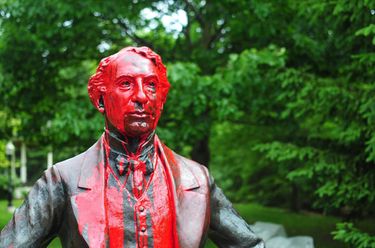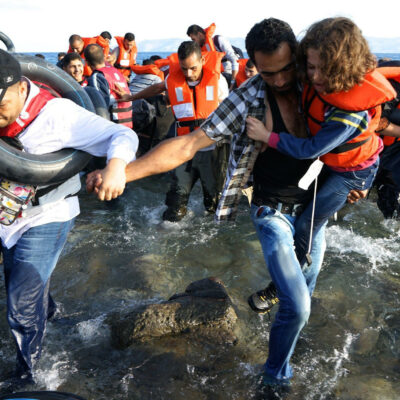Courses: Canadian History (330-201-DW) + Canadian Democracy (385-306-DW)
Eligible students: 3rd semester Law Society Justice Profile
Teachers: Braithwaite + Bourne
 “Human Rights, (In)justice, and Democracy in Canada’s Past and Present” is an integrated team-taught pairing of Canadian History and Canadian Democracy designed especially for third-semester Law Society Justice profile students. These paired courses offer students an exploration of intersecting historical and political themes. We will examine our unquestioning beliefs in Canadian quality and democratic institutions through particular historical events that have challenged concepts of ‘justice’. Working as a team using a interdisciplinary / transdisciplinary approach, the class will examine the historical and political balance between human rights and democracy, through lens such as gender, ethnicity, race, and equality. We will question how our ideologies and institutions have not always lived up to the Canadian promise of equality for all. Students will have the opportunity to hear multiple historical voices and examine a variety of political institutions and ideologies. The semester will culminate in a capstone historical-legal re-enactment that allows us to analyze and assess both the strengths and weaknesses inherent in Canadian democratic society, yesterday and today.
“Human Rights, (In)justice, and Democracy in Canada’s Past and Present” is an integrated team-taught pairing of Canadian History and Canadian Democracy designed especially for third-semester Law Society Justice profile students. These paired courses offer students an exploration of intersecting historical and political themes. We will examine our unquestioning beliefs in Canadian quality and democratic institutions through particular historical events that have challenged concepts of ‘justice’. Working as a team using a interdisciplinary / transdisciplinary approach, the class will examine the historical and political balance between human rights and democracy, through lens such as gender, ethnicity, race, and equality. We will question how our ideologies and institutions have not always lived up to the Canadian promise of equality for all. Students will have the opportunity to hear multiple historical voices and examine a variety of political institutions and ideologies. The semester will culminate in a capstone historical-legal re-enactment that allows us to analyze and assess both the strengths and weaknesses inherent in Canadian democratic society, yesterday and today.

 “How Can I Know Who I Am?” is an integrated team-taught pairing of General Psychology and Introduction to Philosophy. Designed especially for first-semester General Studies Social Science students. Who am I? What do I want to become? These questions can involve tremendous pressure: pressure to conform, pressure to know now what one’s path is going to be, pressure to make the right moral choices in a world in peril, and the anxiety that comes with all of this. This learning community will explore how Philosophy and Psychology investigate the self and identity and apply these investigations to our own paths of self-discovery. In the Psychology course, we will explore current and historical perspectives in the field, the brain and its many functions, why people behave the way they do, and more. In the Philosophy course, we will explore questions such as the nature of the self (and whether there even is one), how free one is to create one’s own identity, the nature of self-love and self-knowledge, the possibility of altruism, and the existential roots of anxiety.
“How Can I Know Who I Am?” is an integrated team-taught pairing of General Psychology and Introduction to Philosophy. Designed especially for first-semester General Studies Social Science students. Who am I? What do I want to become? These questions can involve tremendous pressure: pressure to conform, pressure to know now what one’s path is going to be, pressure to make the right moral choices in a world in peril, and the anxiety that comes with all of this. This learning community will explore how Philosophy and Psychology investigate the self and identity and apply these investigations to our own paths of self-discovery. In the Psychology course, we will explore current and historical perspectives in the field, the brain and its many functions, why people behave the way they do, and more. In the Philosophy course, we will explore questions such as the nature of the self (and whether there even is one), how free one is to create one’s own identity, the nature of self-love and self-knowledge, the possibility of altruism, and the existential roots of anxiety. “Race, Ethnicity and Migration” is an integrated team-taught cluster of three courses – Western Civilization, General Psychology and Introduction to Anthropology – designed especially for first-semester General Studies Social Science students. Students take a History course, a Psychology course and an Anthropology course that explore issues that are very much in the public view today: race, ethnicity and migration. In anthropology, we learn where humans came from and how they migrated over the entire planet. We can also learn why biology is not the place to search for an understanding of “race.” From psychology, we can learn how individuals define their identity, how they cope with the effects of discrimination, and how these effects can influence the genetic make-up of offspring and their coping mechanisms. In history, we explore when and why we shifted away from distinguishing between ethnic groups and toward using the idea of “race” to oppress non-whites. In this cluster, course work and assignment will allow students to make connections across these key social science disciplines, and to also get comfortable with their program, their teachers and their fellow students.
“Race, Ethnicity and Migration” is an integrated team-taught cluster of three courses – Western Civilization, General Psychology and Introduction to Anthropology – designed especially for first-semester General Studies Social Science students. Students take a History course, a Psychology course and an Anthropology course that explore issues that are very much in the public view today: race, ethnicity and migration. In anthropology, we learn where humans came from and how they migrated over the entire planet. We can also learn why biology is not the place to search for an understanding of “race.” From psychology, we can learn how individuals define their identity, how they cope with the effects of discrimination, and how these effects can influence the genetic make-up of offspring and their coping mechanisms. In history, we explore when and why we shifted away from distinguishing between ethnic groups and toward using the idea of “race” to oppress non-whites. In this cluster, course work and assignment will allow students to make connections across these key social science disciplines, and to also get comfortable with their program, their teachers and their fellow students.

Social Justice in Canada?
Courses: Quantitative Methods (360-300-DW) + Canadian History (330-201-DW)
Eligible students: General Studies Social Science students who have passed Research Methods
Teachers: Lander + Kirkland